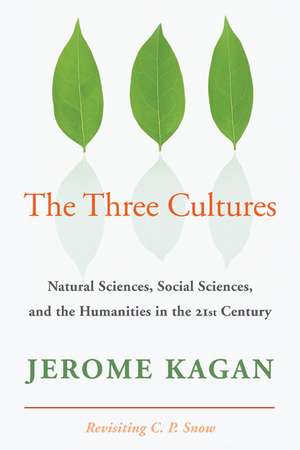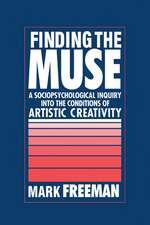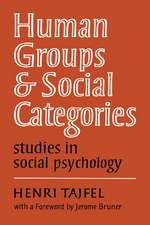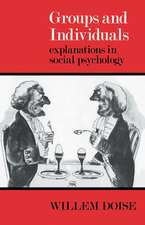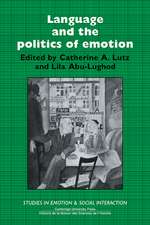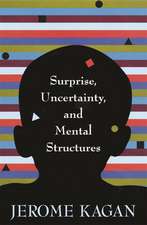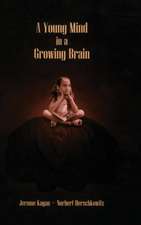The Three Cultures: Natural Sciences, Social Sciences, and the Humanities in the 21st Century
Autor Jerome Kaganen Limba Engleză Paperback – 26 apr 2009
| Toate formatele și edițiile | Preț | Express |
|---|---|---|
| Paperback (1) | 188.94 lei 3-5 săpt. | |
| Cambridge University Press – 26 apr 2009 | 188.94 lei 3-5 săpt. | |
| Hardback (1) | 578.72 lei 6-8 săpt. | |
| Cambridge University Press – 26 apr 2009 | 578.72 lei 6-8 săpt. |
Preț: 188.94 lei
Nou
Puncte Express: 283
Preț estimativ în valută:
36.16€ • 37.52$ • 30.22£
36.16€ • 37.52$ • 30.22£
Carte disponibilă
Livrare economică 24 februarie-10 martie
Preluare comenzi: 021 569.72.76
Specificații
ISBN-13: 9780521732307
ISBN-10: 0521732301
Pagini: 324
Ilustrații: 1 table
Dimensiuni: 150 x 227 x 21 mm
Greutate: 0.45 kg
Editura: Cambridge University Press
Colecția Cambridge University Press
Locul publicării:New York, United States
ISBN-10: 0521732301
Pagini: 324
Ilustrații: 1 table
Dimensiuni: 150 x 227 x 21 mm
Greutate: 0.45 kg
Editura: Cambridge University Press
Colecția Cambridge University Press
Locul publicării:New York, United States
Cuprins
1. Characterizing the three cultures; 2. The natural sciences; 3. Social sciences 1; 4. Social sciences 2; 5. The humanities; 6. Current tensions.
Recenzii
“To anyone interested in the modern academy, Jerome Kagan's Three Cultures is a must read. With penetrating insight and a rare breadth and sense of history, Kagan takes us on a tour of the natural sciences, social sciences and humanities. But much more than a descriptive essay, this work is a profound commentary on the relation between knowledge and the human condition. It should be read by scholars and students in every discipline and will hopefully cultivate a bit more humility in our institutions of higher learning.”
—Richard Davidson, University of Wisconsin-Madison
“Jerome Kagan, a highly distinguished developmental psychologist, here demonstrates an enormous breadth of knowledge of the three cultures – natural sciences, social sciences, and the humanities. In comparing them he discusses such issues as their different criteria of truth, their tendency to give differing interpretations of the same event, and their changing relative popularity. In discussing each in turn he emphasizes its successes and failures, its merits and errors. This book is stimulating and provocative from the first page if only because no reader will agree with every one of his points. It should be widely read.”
—Robert Hinde, St. John's College, Cambridge
"The Three Cultures compares the premises, vocabulary, sources of evidence, contributions, and limitations of the research, scholarship, and theories of natural scientists, social scientists, and humanists...The book ends by asking scholars in and out of the Academy to adopt a posture of greater humility. It is time for the members of all three cultures to recognize that, like tigers, sharks, and hawks, each is potent in its own territory but impotent in the territory of the other."
—Rorotoko
"...The Three Cultures is best read as if you and your acquaintance, the author, were taking a stroll through once-familiar paths...Kagan’s opinions are uncluttered, instructive, and wise. Each reader will take from the text those that challenge thinking..."
--Douglas K. Candland, PsycCRITIQUES
"...this is an invaluable contribution to an ongoing discussion. Highly Recommended..."
--L.R. Braunstein, Dartmouth College, CHOICE
"The knowledge demonstrated by the author, with the enumerable demonstrations (instructive and at times funny, as they are) of all three scientific cultures is very impressive and admirable...As Kagan concludes: "It is time for the members of the three cultures to adopt a posture of greater humility" [275]. Just for this reason alone this book should be widely read by scholars, but especially by students of every possible discipline."
--Kristoph K.P. Vanhoutte, metapsychology.net
—Richard Davidson, University of Wisconsin-Madison
“Jerome Kagan, a highly distinguished developmental psychologist, here demonstrates an enormous breadth of knowledge of the three cultures – natural sciences, social sciences, and the humanities. In comparing them he discusses such issues as their different criteria of truth, their tendency to give differing interpretations of the same event, and their changing relative popularity. In discussing each in turn he emphasizes its successes and failures, its merits and errors. This book is stimulating and provocative from the first page if only because no reader will agree with every one of his points. It should be widely read.”
—Robert Hinde, St. John's College, Cambridge
"The Three Cultures compares the premises, vocabulary, sources of evidence, contributions, and limitations of the research, scholarship, and theories of natural scientists, social scientists, and humanists...The book ends by asking scholars in and out of the Academy to adopt a posture of greater humility. It is time for the members of all three cultures to recognize that, like tigers, sharks, and hawks, each is potent in its own territory but impotent in the territory of the other."
—Rorotoko
"...The Three Cultures is best read as if you and your acquaintance, the author, were taking a stroll through once-familiar paths...Kagan’s opinions are uncluttered, instructive, and wise. Each reader will take from the text those that challenge thinking..."
--Douglas K. Candland, PsycCRITIQUES
"...this is an invaluable contribution to an ongoing discussion. Highly Recommended..."
--L.R. Braunstein, Dartmouth College, CHOICE
"The knowledge demonstrated by the author, with the enumerable demonstrations (instructive and at times funny, as they are) of all three scientific cultures is very impressive and admirable...As Kagan concludes: "It is time for the members of the three cultures to adopt a posture of greater humility" [275]. Just for this reason alone this book should be widely read by scholars, but especially by students of every possible discipline."
--Kristoph K.P. Vanhoutte, metapsychology.net
Notă biografică
Descriere
Jerome Kagan examines the basic goals, vocabulary, and assumptions of the natural sciences, social sciences, and humanities, summarizing their unique contributions to our understanding of human nature.
